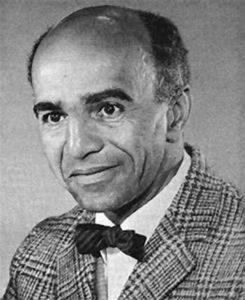
David Blackwell
David Blackwell was born on this date in 1919. He was a Black mathematician and professor.
David Harold Blackwell grew up in Centralia, Illinois, a town on the Mason-Dixon Line. His family expected and supported his work ethic. As a student, Blackwell did not care for algebra and trigonometry.
He said, "I could do it, and I could see that it was useful, but it wasn't really exciting." Geometry turned him on. "The most interesting thing I remember from calculus was Newton's method for solving equations. That was the only thing in calculus I really liked. The rest of it looked like stuff that was useful for engineers in finding moments of inertia and volumes and such." In his junior year, he took an elementary analysis course and fell in love with mathematics. "That's the first time I knew that serious mathematics was for me. It became clear that it was not simply a few things that I liked. The whole subject was just beautiful."
Blackwell entered the University of Illinois at Urbana-Champaign in 1935 after receiving his Ph.D. Dr. Blackwell was appointed a Postdoctoral Fellow at the Institute for Advanced Study in 1941 for a year. At that time, members of the Institute were automatically officially made visiting fellows of Princeton University, and thus Blackwell was listed in its bulletin as such. This caused problems because there had never been a Black student, much less a faculty fellow, at the University [most notably, it had rejected Paul Robeson solely on race]. The president of Princeton told the institute director that the organization was abusing the university's hospitality by admitting a Black student.
Colleagues in Princeton wished to extend Blackwell's appointment; however, the president organized a protest. When it was time to leave the institute, Blackwell applied to all 105 Black schools in America. After instructing at Southern University and Clark College in 1944, Dr. Blackwell joined the faculty of Howard University as an instructor. In three years, Blackwell rose to become a Full Professor and Chairman. Blackwell published substantial research despite heavy teaching, administrative duties, and a mathematically not stimulating institution.
He spent summers at the RAND Corporation as a Visiting Professor of Statistics at Stanford University from 1950-51. Also during this time, Blackwell met M. A. Girschick of the Department of Agriculture, who was to be a collaborator in many works: their 1954 book, Theory of Games and Statistical Decisions, is a classic in the area. Except for a one-year visit to Stanford University, Blackwell stayed at Howard until 1954. When he left, he had been Chair of the Department of Mathematics and had published more than 20 papers. From there, he was appointed Professor of Statistics at the University of California at Berkeley, where he was chairman of the Statistics Department.
He was President of the Institute of Mathematical Statistics in 1955. He has also been Vice President of the American Statistical Association, the International Statistical Institute, and the American Mathematical Society. Blackwell is an Honorary Fellow of the Royal Statistical Society. In 1965, he became the first African American to be named to the National Academy of Sciences. In 1979, Blackwell won the Von Neumann Theory Prize (the Operations Research Society of America) 1979. He is also a member of the American Academy of Arts and Sciences. Centralia, Illinois.
Blackwell and his wife have raised eight children, none of whom have any particular mathematical interests. The Blackwells bought a 40-acre retreat in northern California, complete with a creek and big redwoods.
University of Washington
3000 Landerholm Circle SE,
Bellevue, Washington 98007 USA,
(425) 564-1000